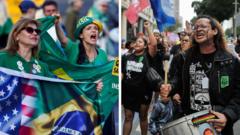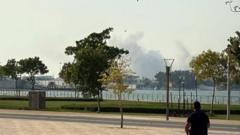Is Jair Bolsonaro's Coup Trial Deepening Brazil's Divide?

Published: 2025-09-08 15:21:07 | Category: technology
This year’s Brazilian Independence Day on 7 September was marked by deep political divisions, as rival rallies took place amidst the imminent verdict in the coup trial of former President Jair Bolsonaro. While some demonstrators championed Bolsonaro's legacy, others rallied for the preservation of democracy, reflecting the country's ongoing struggle between loyalty and accountability.
Last updated: 07 October 2023 (BST)
Understanding the Political Landscape in Brazil
Brazil's political climate is extremely polarized, especially as the nation approaches key judicial decisions regarding former President Jair Bolsonaro. The trial, which centres on allegations of coup attempts and various plots against political figures, has ignited fierce debates about democracy, freedom, and accountability in Brazil.
- Brazil's Independence Day celebrations coincided with rival rallies for and against Bolsonaro.
- The Supreme Court's verdict on Bolsonaro's alleged coup involvement is expected soon.
- Supporters and critics of Bolsonaro have vastly different interpretations of justice and democracy.
- Past events, including the January 8 riots, have heightened tensions surrounding the trial.
- US involvement and sanctions complicate the domestic political landscape.
A Brief History of Brazil's Democracy
Brazil restored its democracy in 1985 after two decades of military dictatorship. The current political turmoil draws on this history, with many citizens wary of authoritarianism. The Supreme Court, seen as the guardian of democracy, has taken on a contentious role, particularly during the Bolsonaro era.
The Allegations Against Bolsonaro
The charges against Bolsonaro are serious, including:
- Proposing a coup to military leaders.
- Being aware of assassination plots against President-elect Lula da Silva and Justice Alexandre de Moraes.
- Inciting his supporters to attack government buildings after the election.
Bolsonaro has refuted these claims, labelling them as politically motivated. His supporters echo this sentiment, claiming the trial is a form of persecution.
The Role of the Supreme Court
The Supreme Court's involvement in this trial has raised eyebrows. The justices are tasked with investigating allegations of coup attempts while also overseeing the electoral process. Concerns about bias have emerged, particularly because Justice Moraes, who is leading the trial, is himself a target of assassination allegations.
Reactions from the Public
The public response to Bolsonaro's trial is divided. Supporters view the proceedings as an attack on their leader and call for amnesty. Critics argue that the trial is essential for preserving democracy. This division was evident during the recent Independence Day rallies.
The Pro-Bolsonaro Rally
At the pro-Bolsonaro rally in São Paulo, attendees waved flags and wore clothing that symbolised their allegiance. Slogans such as "Moraes, out!" and "Amnesty!" were prevalent, signalling their disdain for the judicial process. Protesters like Bianca expressed hope that US sanctions would sway public opinion in their favour.
The Opposition Rally
Conversely, the anti-Bolsonaro rally featured chants of "No amnesty" and "Dictatorship, never again." Protesters expressed their belief that Bolsonaro should face the consequences of his actions. Large inflatable figures of Bolsonaro in prison attire symbolised their demand for accountability.
Implications of the Trial
The outcome of Bolsonaro's trial could have far-reaching effects on Brazil's political landscape. A conviction could solidify the notion that attempts to undermine democracy will not be tolerated, while an acquittal may embolden his supporters and sustain political divisions.
US Influence in Brazilian Politics
The involvement of former US President Donald Trump has further complicated the situation. His support for Bolsonaro and his imposition of tariffs on Brazilian goods have been interpreted as an attempt to influence the trial's outcome. Many Brazilians feel that this foreign interference undermines their sovereignty.
What’s Next for Brazil?
As the Supreme Court prepares to deliver its verdict, Bolsonaro's party is advocating for legislation to grant amnesty to him and the January 8 protesters. This move could signal a broader push to absolve those involved in the riots, further polarising the nation.
Conclusion: A Nation at a Crossroads
The political landscape in Brazil remains fragile, with the potential for either a reaffirmation of democratic principles or a slide back into authoritarianism. The outcome of Bolsonaro's trial will be a pivotal moment in determining the future of Brazil's democracy. As the nation grapples with its identity, the question remains: will Brazil emerge united, or will the divisions deepen?
#BrazilPolitics #BolsonaroTrial #DemocracyAtRisk
FAQs
What are the main charges against Jair Bolsonaro?
Jair Bolsonaro faces allegations of proposing a coup, being aware of assassination plots, and inciting his supporters to attack government buildings after losing the 2022 election.
How has the Supreme Court influenced the trial?
The Supreme Court is seen as the guardian of democracy in Brazil. Its involvement in the trial has raised questions about bias, particularly as the presiding justice is also a target of an assassination plot linked to Bolsonaro.
What are the implications of US involvement in Brazilian politics?
The US's actions, including tariffs on Brazilian goods and support for Bolsonaro, have been interpreted as interference in Brazil's domestic affairs, further complicating the political landscape.
What do the public protests reveal about Brazilian society?
The protests highlight the deep divisions in Brazilian society, with supporters and opponents of Bolsonaro expressing starkly different views on democracy and accountability.
What could happen if Bolsonaro is convicted?
A conviction could potentially strengthen democratic institutions in Brazil by sending a message that attempts to undermine democracy will not be tolerated, while also deepening existing political divisions.



